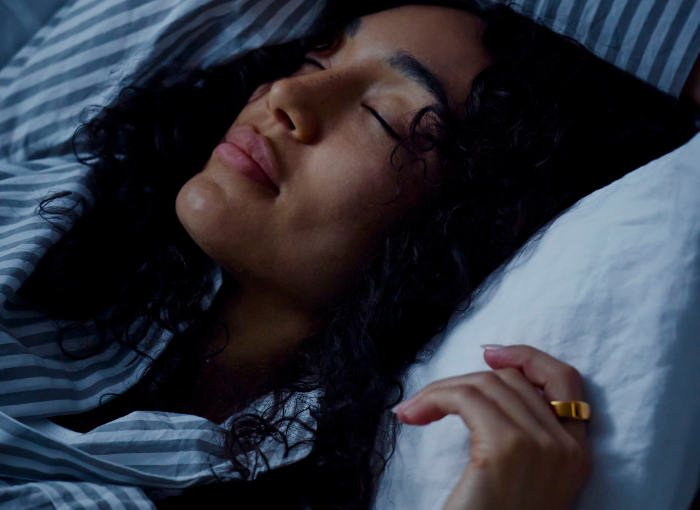- Rapid eye movement (REM) sleep is one of the four sleep stages, and accounts for 20-25% of your total sleep as REM.
- Wondering how to increase REM sleep? Consider magnesium, improve sleep hygiene, cut caffeine, and try to get more total sleep.
- You can monitor how much REM sleep you’re getting by using Oura.
Rapid eye movement (REM) sleep, one of four main sleep stages, is critical for brain health and emotional resilience.
We tend to think of sleep as a passive process. But REM, also known as “paradoxical sleep,” engages the body and brain in a very similarly way to waking life. Here, learn more about this essential sleep stage, and how to increase your REM sleep if you’re not getting enough.
| Member Tip: Use Oura to see how much REM sleep you’re getting at night and to identify the strategies that lead to the most REM sleep at night by using Tags and Discoveries. |
What Happens During REM Sleep?
During REM sleep, as the name suggests, your eyes move rapidly behind your closed eyelids, your heart rate speeds up, and breathing becomes irregular. Brain activity also speeds up, mimicking brainwave activity while you’re awake. You may also experience irregular, jerky muscle twitches as you dream, and it tends to be more difficult to wake up during REM sleep. To protect yourself from acting out dreams, your body can also a loss of muscle tone during REM.
While it’s no longer true that you only dream during REM sleep, studies suggest that about 80% of vivid dream recall results after arousal from this stage of sleep.
LEARN MORE: What Are the Stages of Sleep?
How Much REM Sleep Do You Need?
In humans, REM sleep periods occur every 90 to 120 minutes. You’ll experience your first REM cycle about 60 to 90 minutes after falling asleep, which lasts around 10 minutes in duration. With each new cycle, you spend increasing amounts of time in REM sleep, with most of your REM sleep taking place in the second half of the night, the Sleep Foundation reports.
Healthy adults should expect to spend about 20-25% of your total time asleep in REM sleep. This means that if you get 7-8 hours of sleep, expect about 90 minutes of REM. Note that the amount of REM sleep decreases as you age; while infants spend around 50% of their sleep in REM, older adults might get less.
Benefits of REM Sleep
Research has shown that REM plays an incredibly important role in both emotional health and learning.
Sleep scientist Matthew Walker, Ph.D., author of Why We Sleep and an Oura advisor, describes REM sleep as a sort of “informational alchemy.” “Essentially, REM is creating a revised mind-wide web of associations,” Walker said in an interview. “We make connections during REM sleep.” Exactly how this REM learning occurs isn’t known, but research suggests that REM prunes synapses to facilitate learning.
Furthermore, getting enough REM sleep may help mitigate potentially negative emotional reactions. How? REM sleep is associated with an overnight reduction in amygdala reactivity — the area of the brain responsible for anxiety, stress and fear. Scientists reason that the low adrenaline during REM sleep decreases the emotional intensity of events as we reprocess them in dreams, which promotes emotional balance.
Say, for instance, you got in a fender bender before work. REM sleep could help reduce the negative charge of that experience when you think about it the next day, safeguarding you from potential anxiety.
| Member Story: Oura member Hemang K. understands how important REM sleep is for his mental health and emotional capacity, so much so that he adjusts his work day if he doesn’t get enough of it. |
How to Increase REM Sleep: 7 Strategies
In general, most sleep interventions will improve REM because more sleep = more chances for REM. As with all things health and well-being, what works for one person won’t work for everyone, so experiment with the below advice and find what works best for you.
1. Supplement with magnesium.
The neurotransmitter GABA regulates REM sleep. And if you don’t have enough GABA to crank out some vivid dreams and reset those pesky emotions, magnesium deficiency could be to blame.
You can try a magnesium supplement to make up for any deficit. In a study on older adults with insomnia, magnesium supplementation reduced early morning awakening – the time most associated with REM sleep – and it improved sleep onset.
2. Avoid alcohol and marijuana.
This probably won’t come as a surprise, but a night of drinking can wreck your REM sleep. Alcohol has been shown to delay REM sleep and lead to less REM overall. Because drinking also decreases your total sleep time for several reasons, and REM is weighted later in your sleep cycles, alcohol leads to fewer total minutes in REM.
Similarly, while marijuana use can increase deep sleep, research has shown it can reduce rapid eye movement. Occasional users shouldn’t have much to worry about, but studies suggest that long-term marijuana use is associated with chronically depleted REM sleep.
RELATED: How Does Alcohol Impact Oura Members?
3. Experiment with soothing scents.
Your olfactory system (sense of smell) is powerful, and odors can greatly impact the quality of your sleep, says Dr. Michael Breus, aka The Sleep Doctor. The most soothing scents include lavender, rose, vanilla, and chamomile, while more energizing smells such as peppermint or lemon should be avoided right before bed.
Reap the benefits of aromatherapy with essential oils (either infused into the air via a diffuser or rubbed on the skin), using scented body lotions, trying a linen spray, or bringing in some fresh flowers or plants. For safety’s sake, skip the candles in the bedroom.
Be sure to avoid stimulating essential oils before bed, including eucalyptus, citrus, and bergamot.
LEARN MORE: 5 Ways to Upgrade Your Sleep Hygiene
4. Get more light during the day, less at night.
Research has found that later first-light exposure and later light exposure at night both negatively influenced REM sleep patterns. Walker echoes this point, explaining that this combination of light/dark deprivation can cause problems with your sleep: “What happens is that your brain goes through life in this stupor state where it’s not getting enough daylight to keep it ramped up throughout the day,” he said, also noting that we don’t get enough dark at night to wind down.
Walker recommends reversing the trend by spending 30 to 40 minutes outside each morning (even if it’s cloudy) and turning off all melatonin-halting blue lights at least two hours before bedtime.
READ MORE: How Blue Light Impacts Your Sleep

5. Cut back on caffeine.
A two-week sleep study involving 18 healthy men suggested that caffeine close to bedtime inverts the normal sleep cycle: REM sleep happened earlier in the night, and slow wave sleep happened later. Other research has shown that afternoon coffee didn’t have an impact on REM per se but decreased the average sleep time by a whole hour.
People differs greatly in their physiological response to caffeine. While caffeine typically has a half-life of 5 to 6 hours (meaning, if you consume 200mg of caffeine, 100mg will still be present in your system 5-6 hours later), the time depends on age, weight, gender, hormones, and metabolism. For older people, it may take longer (up to 20 hours!) to metabolize caffeine.
Experts generally suggest avoiding caffeine at least six hours before bed. If you can’t give up that late-afternoon cup of joe, switch to decaf coffee or tea to avoid sleep disruptions.
LEARN MORE: The Impact of Caffeine on Sleep
6. Cool it down.
Research shows that your body temperature decreases with deep sleep and can increase during REM. (This means that if you were to wake up hot, it’s likelier to happen when your eyes are rolling around in your head watching a kaleidoscopic dream.)
A safe bet to preserve your REM sleep is to sleep in a comfortably cool room, between 60 and 67 degrees Fahrenheit. Less is more when it comes to PJs, and choose sheets made with cooling materials — think: linen, bamboo, or Tencel.
READ MORE: How to Choose the Best Bedding for a Better Night’s Sleep
7. Maximize your time in bed.
The majority of REM occurs in the last couple hours of sleep. You might be able to function on five or six hours, but you’ll skip out on most of the incredible benefits of REM sleep if you do. Aim for seven to nine hours to make sure you’re reaping the benefits of REM.
How Accurate is Oura Ring for Tracking REM Sleep?
Wondering how accurate Oura is at distinguishing REM sleep from the other sleep stages? Good news: According to recent external validation studies, sleep staging accuracy ranged between 75.5 % (light sleep) and 90.6 % (REM sleep). The Oura Ring had a sensitivity of 94.4 % to 94.5%. In fact, these studies found that Oura Ring did not “significantly differ” from gold standard sleep lab testing (PSG).
The researchers concluded: “Oura has high sensitivity and specificity with almost perfect agreement with PSG for 2-stage sleep classification, and an inter-device reliability of 94.8 %.” That means that Oura is so accurate; it’s like having an entire sleep lab right there at your fingertips.
RELATED: Restless Sleep? How to Reduce Tossing and Turning at Night




